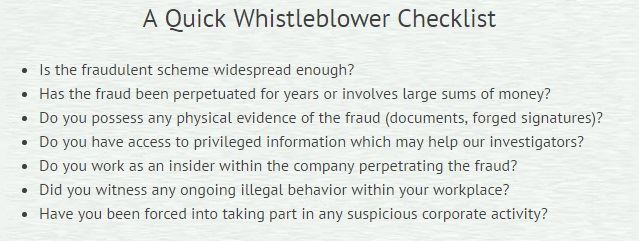
Whistleblower Protection and Rights
The whistleblower programs, laws, and several practical policies protect those who decide to come forward in several ways. Several whistleblower programs offer restitution, backpay and reinstatement as remedies if successful in your anti-retaliation claim.
Whistleblowers are heroes, not unloyal turncoats
Corporate cultures in many workplaces value loyalty above all else, even to the point of disobeying the law in order to protect people inside the company. This form of blind obedience is often a one-way street, and workers get no benefits other than just the opportunity to keep working. Corporations just take advantage of their employees in order to minimize their own risk while giving nothing in return.
Because of this widespread practice, whistleblowers were unfairly characterized as unloyal turncoats and experienced retaliation in the workplace in the form of demotion, termination, or extreme mobbing. Today, however, many new laws protect them against all forms of harassment since the U.S. Government fully understand that their heroic efforts to fight for justice are indispensable to our country. In almost all circumstances, an individual who blows the whistle is legally entitled to continue their work without discrimination or any negative consequences from his choice.
Filing Anonymous Whistleblower Claims

Multiple laws and reward programs’ procedures protect the whistleblower’s identity by allowing him to file a claim anonymously and hiring a lawyer to represent him in court. In addition, an unsuccessful case can be dismissed before it is made public. The attorney will organize, file and facilitate the litigation and eventually advocate on his behalf. Both the Dodd–Frank Actand the IRS whistleblower program protect relators’ identities.
Protection Against Corporate Retaliation
In the event a whistleblower’s identity becomes known or he chooses to go public with his case, multiple additional statutes strictly prohibit any sort of retaliation. Defendants that act against a qui tam relator risk additional civil penalties and a harsher enforcement action for the misconduct reported. Companies can also be sued separately whenever any form of harassment occurs. Restitution in these cases can include double back pay, reinstatement to the original position, reimbursement for the expenses, and in some instances a promotion to a superior position.
The False Claims Act’s Anti-Retaliation provision legally protects those who blew the whistle from retaliation for any act related to their claim, including discussing with an attorney or reporting fraud either internally or externally. A worker does not even need to actually file a case to be protected under the Act’s protection clauses.
What do you need to become a whistleblower?
If you want to report an ongoing or widespread fraud you witnessed within your workplace, you need to be sure that you possess enough information to build a solid case. If you can back up your information with insider knowledge or substantial physical evidence, you may have a chance of becoming a successful whistleblower and take the first step by filing a legal whistleblower action.

General Whistleblower news:
-
SEC Awards $250,000 to Two Whistleblowers
- Whistleblower News
One of the best tools the Securities Exchange Commission (SEC) has to help reduce fraudulent activities and protect investors is its Whistleblower Program, which provides a reward of 10%-30% of monies ...
Read More -
Money laundering, the art market, and the proposed ENABLERS Act
- Whistleblower News
Money laundering is the act of concealing the origins of money, usually of criminal origin. When people obtain funds from criminal endeavors, they must find ways to use the money in a non-suspicious ...
Read More -
Theranos whistleblower exposes widespread healthcare fraud
- Whistleblower News
The whistleblower who exposed the healthcare fraud occurring at Theranos Inc. reports a vast scheme used to manipulate lab tests and quality-control checks. Tyler Shultz is the grandson of George P. ...
Read More

















